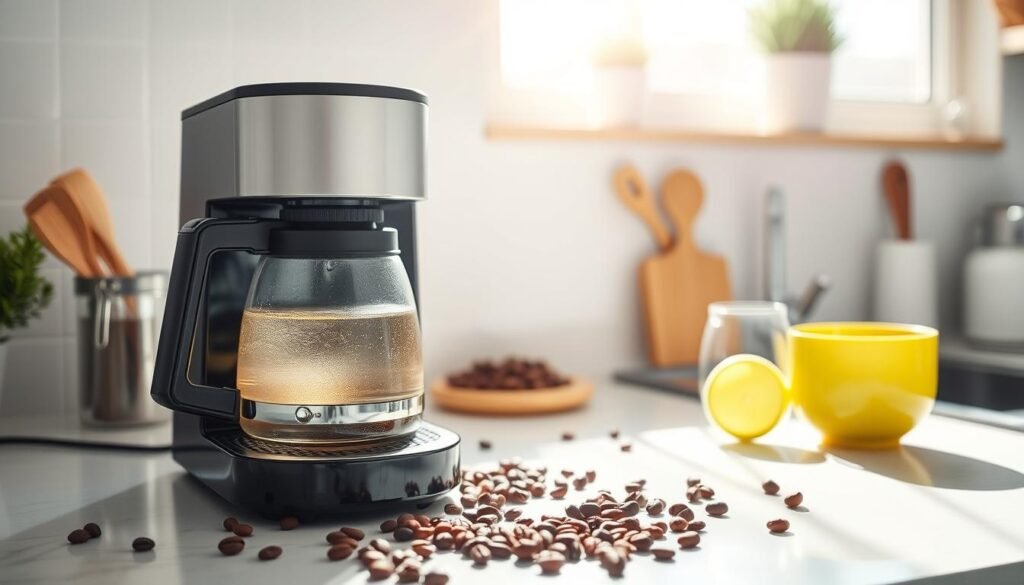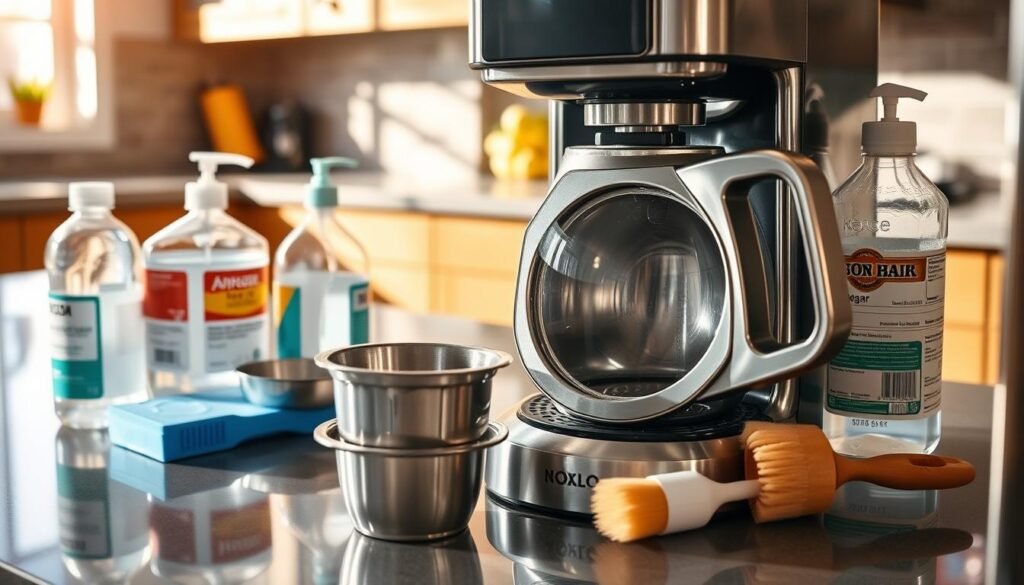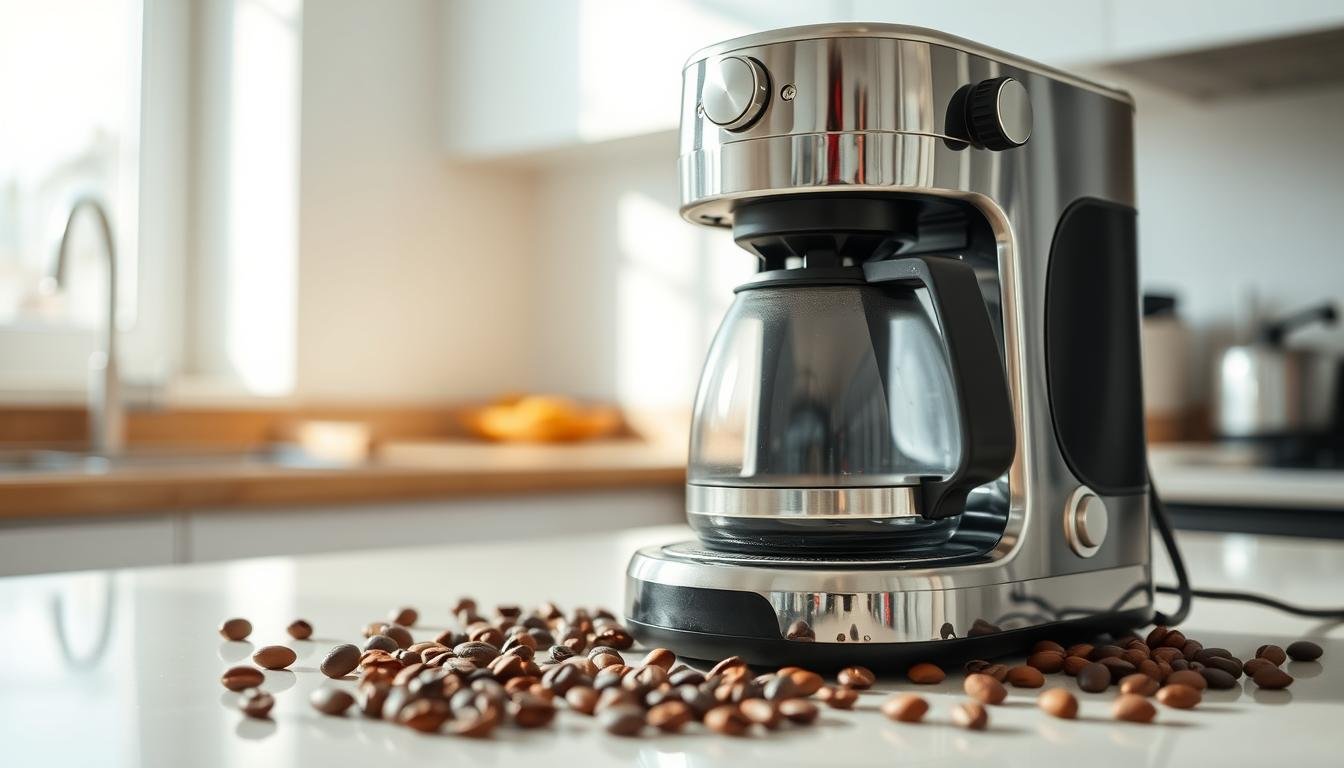As a coffee lover, I know how great a fresh cup of coffee can make my day. But did you know your coffee maker can hide a big threat? A study by NSF International found that coffee makers are among the germiest places in homes. Half of the tested reservoirs had yeast and mold.
Cleaning your coffee maker regularly is key for the best coffee taste and a safe brewing space. It doesn’t matter if you drink coffee every day or just sometimes. Knowing how to clean coffee maker can make a big difference.
In this guide, we’ll cover why, when, and how to clean your coffee maker. You’ll learn how to keep your machine clean and your coffee safe and delicious every time.
Why Regular Coffee Maker Cleaning is Essential
Keeping your coffee maker clean is key for many reasons. It helps your machine last longer and keeps your coffee tasting great. Plus, it’s good for your health.
Health Risks of a Dirty Coffee Maker
A dirty coffee maker can harbor mold, bacteria, and yeast. These can be harmful to your health. In fact, the water reservoir in your coffee maker is one of the germiest spots in your kitchen or bathroom.
Drinking coffee from a dirty machine can cause allergic reactions or infections. So, it’s vital to clean your coffee maker regularly.
Impact on Coffee Taste and Quality
Minerals, coffee residue, and impurities can ruin your coffee’s taste and quality. Over time, these can make your coffee taste bitter or stale. To keep your coffee tasting its best, regular coffee maker maintenance is a must.
Signs Your Coffee Maker Needs Cleaning
- Unusual noises or slower brewing times
- Bitter or unpleasant-tasting coffee
- Visible mineral deposits or mold growth
- Unpleasant odors or lukewarm coffee
If you see any of these signs, it’s time to clean your coffee maker. Use vinegar or another effective solution. A clean machine brews better coffee and lasts longer, ensuring you enjoy safe, tasty coffee for years.
Daily coffee lovers should deep clean their machines monthly. Less frequent users can do it every 2-3 months. Also, clean all removable parts after each use to avoid residue buildup and keep your machine running well.
Understanding Mineral Buildup and Coffee Residue
If you drink coffee often, you’ve probably seen mineral buildup and coffee residue in your maker. These can really affect how your coffee tastes and how well your machine works.
Mineral buildup, or “scale,” happens when hard water flows through your coffee maker. Minerals like calcium and magnesium stick to parts like the heating element. This can make your coffee too warm and even stop your machine from working right.
Coffee makers also get oily from coffee grounds. These oils can make your coffee taste bad and smell different. They can also block parts inside, making your coffee less tasty.
It’s key to descaling and clean your coffee maker often. Vinegar is a great, natural way to get rid of both mineral buildup and oily residue. Cleaning regularly will keep your coffee maker working well and your coffee tasting great.
“Keeping your coffee maker clean is crucial for producing the best-tasting coffee and ensuring its longevity. Don’t neglect this essential maintenance task!”
To keep your coffee maker at its best, clean it at least once a month if you use it every day. If you only use it sometimes, clean it every two to three months. Look out for signs it needs cleaning, like:
- Unusual noises during the brew cycle
- Slower brewing time
- Off-flavor or bitterness in the coffee
- Visible mineral deposits
- Mold or unpleasant odors
- The coffee maker stopping mid-brew
By understanding the need for regular descaling and cleaning, you can keep your coffee maker in great shape. This way, you’ll enjoy delicious coffee for many years.
Essential Cleaning Supplies and Materials
Keeping your coffee maker clean is key to making the perfect coffee. You’ll need specific supplies and materials for this. These include white distilled vinegar, baking soda, dish soap, water, soft cloths or sponges, and a soft brush or toothbrush.
Natural Cleaning Agents
Your kitchen pantry holds the secret to cleaning your coffee maker naturally. White distilled vinegar and lemon juice are great for removing buildup and coffee residue.
Tools and Equipment
You’ll also need some tools for cleaning. A carafe, a filter basket, and a water filter (if your machine has one) are essential.
Safety Precautions
Always take safety first when cleaning your coffee maker. First, unplug the machine to prevent electrical hazards. Don’t use harsh chemicals and make sure all parts are dry before putting everything back together.
For a deep clean, consider using coffee maker cleaning tablets or a descaling solution. These products are made to remove tough buildup and keep your coffee maker working well.
With the right cleaning supplies, you can keep your coffee maker in excellent condition. This ensures your coffee always tastes great and your machine lasts longer.
How to Clean Coffee Maker with Vinegar
Keeping your coffee maker clean is key to making the perfect cup of coffee. White vinegar is a great, natural way to clean it. It gets rid of mineral buildup, coffee residue, and bad smells, making your coffee maker work better.
- Unplug your coffee maker and take out any parts you can remove, like the carafe, filter basket, and water reservoir.
- Soak these parts in warm, soapy water and make sure to rinse them well.
- Combine equal parts white vinegar and water in a measuring cup.
- Pour this mix into the water reservoir and start a brew cycle, but stop it halfway.
- Let it sit for 30-60 minutes, then finish the brew cycle.
- Throw out the vinegar mix and run 2-3 more brew cycles with fresh water to clean it out.
- Use a damp cloth to wipe the outside of the coffee maker, then put it back together.
This method effectively removes mineral buildup and coffee residue. It makes your coffee taste better and your coffee maker work better. If there’s tough buildup, you might need to do the vinegar cleaning a few times before rinsing.
“Regular maintenance of cleaning your coffee maker with vinegar can help prolong its lifespan and ensure its efficient operation.”
Some coffee maker makers say not to use vinegar because it might harm metal parts. Always check your maker’s instructions before using vinegar. Or, you can use a commercial cleaner or a baking soda and water mix as a safe and effective way to clean.

By cleaning your coffee maker with vinegar regularly, you’ll keep it in great shape. This way, you’ll enjoy delicious coffee for many years.
Alternative Cleaning Solutions and Methods
Vinegar is a popular choice for cleaning coffee makers. But, there are other solutions and methods you can try. These include natural ingredients and commercial cleaners, each with its own benefits.
Baking Soda Method
Baking soda is great for cleaning your coffee maker. Mix a quarter cup of it with warm water. Then, run this solution through your machine.
The baking soda’s mild abrasive nature helps remove tough stains and odors. This leaves your coffee maker fresh and ready to make great coffee.
Lemon Juice Technique
Lemon juice is a natural descaling agent for coffee makers. Like vinegar, it can remove mineral buildup and disinfect your machine. Plus, it leaves a fresh scent.
Commercial Cleaners
For a more specialized cleaning, there are commercial cleaners made for coffee makers. These products are good at removing tough residues and stains. They might cost more than homemade solutions, but they offer a deep clean.
When picking a cleaning method, think about how well it works, its cost, and its impact on the environment. Baking soda and lemon juice are natural and cheap. Commercial cleaners are more effective but pricier. Choose what works best for you and your coffee maker.
Deep Cleaning Your Coffee Maker Components
Keeping your coffee maker clean is key to making the perfect cup. Regular wiping and quick rinses help, but a deep clean is needed for tough buildup. Let’s look at how to clean each part of your coffee maker well.
Carafe Cleaning
Begin by washing the carafe with hot, soapy water. If it’s dishwasher-safe, put it on the top rack. Make sure it’s dry before putting it back in your coffee maker.
Brew Basket Maintenance
Take out the brew basket and throw away any coffee grounds. Clean it with warm, soapy water and a soft brush. Rinse well and let it dry before putting it back.
Permanent Filter Cleaning
For permanent filters, clean them well. Wash with warm, soapy water to remove oils and residue. Dry it completely before putting it back.
Water Reservoir Cleaning
Wipe the water reservoir with a damp cloth. Be careful not to use harsh chemicals. Dry it well before filling it with water again.
Spray Head Declogging
The spray head can get clogged with minerals. Use a toothpick or small brush to clean out the holes.
Heating Element Maintenance
If you can see the heating element, clean it with a damp cloth. This removes residue and minerals.
After cleaning, make sure everything is dry before putting your coffee maker back together. Experts say to deep clean monthly for daily use, and every two to three months for less use. This keeps your coffee maker working well and your coffee tasting great.

Spending time on deep cleaning your coffee maker’s parts ensures it keeps making great coffee. This way, your coffee stays free from bad tastes and smells.
| Cleaning Frequency | Recommended for Daily Users | Recommended for Less Frequent Users |
|---|---|---|
| Deep Cleaning | At least once a month | Every two to three months |
Maintaining Your Coffee Maker Between Deep Cleans
To keep your coffee maker in great shape, you need to do more than just deep clean it sometimes. Spend a few minutes each day and week on simple tasks. This will help your machine make delicious coffee and last longer.
Daily Maintenance Tips
- Throw away used coffee grounds right after you brew.
- Wash the carafe and filter basket with hot water to stop buildup.
- Use a damp cloth to clean the coffee maker’s outside and get rid of spills.
- Keep the lid open to let the machine dry and avoid mold.
Weekly Cleaning Routine
- Scrub the carafe and filter basket with warm, soapy water.
- Use a damp cloth to clean the water reservoir and remove deposits.
- Run a brew cycle with just water to clear out the system and get rid of coffee residue.
- Check and replace the water filter if your machine has one.
Following these daily and weekly steps will stop mineral and coffee buildup. This ensures your coffee maker always makes great coffee and works well. Taking care of your coffee maker is important for coffee maker maintenance, daily coffee maker cleaning, and weekly coffee maker care.
| Task | Frequency | Importance |
|---|---|---|
| Discard used grounds | Daily | Prevents residue buildup |
| Rinse carafe and filter | Daily | Maintains cleanliness |
| Wipe down exterior | Daily | Removes spills and splatters |
| Wash removable parts | Weekly | Thorough cleaning |
| Flush system with water | Weekly | Removes residual coffee |
| Replace water filter | As needed | Ensures water quality |
“Regular maintenance prevents buildup, ensures consistent coffee quality, and extends the machine’s lifespan.”
Cleaning Different Types of Coffee Makers
Keeping your coffee maker clean is key to a great cup of coffee. But, the cleaning method changes based on your coffee maker type. Let’s look at the best ways to clean each model:
Drip Coffee Makers: For drip coffee makers, vinegar is the best cleaner. Mix equal parts white vinegar and water and run a cycle. This removes mineral buildup and residue. Then, run a few cycles with just water to rinse well.
Keurig and Pod Machines: Keurig and pod machines need special care. Use vinegar to descale the machine. Also, clean the needle and K-cup holder often to avoid clogs and keep performance high.
French Press: cleaning a French press is easy. Take it apart and wash all parts with warm, soapy water after each use. Rinse well to remove soap and let dry before putting it back together.
Espresso Machines: espresso machines need special cleaning. Check the manufacturer’s guide for the right descaling and backflushing steps. This keeps your machine working well.
Cold Brew Makers: cold brew makers need a deep clean after each use to stop mold and bacteria. Take it apart, wash with warm, soapy water, and dry well before using or storing.
Always check the maker’s guide for specific cleaning tips and approved cleaners. Regular care ensures your coffee maker always makes a great cup.
| Coffee Maker Type | Recommended Cleaning Method | Cleaning Frequency |
|---|---|---|
| Drip Coffee Maker | Vinegar solution | Monthly or bi-weekly for daily use |
| Keurig/Pod Machines | Vinegar solution, clean needle and K-cup holder | Monthly or bi-weekly for daily use |
| French Press | Disassemble and wash all parts with soap and water | After each use |
| Espresso Machines | Follow manufacturer’s instructions for descaling and backflushing | Every 3-6 months |
| Cold Brew Makers | Disassemble and wash all parts with soap and water | After each use |
Regular cleaning keeps your coffee maker working well and your coffee tasting great.
Preventing Future Buildup and Maintenance Tips
Keeping your coffee maker clean and working well is key for great-tasting coffee. It also helps your appliance last longer. Here are some important tips to prevent buildup and keep your coffee maker in great condition:
Water Quality Considerations
The water you use affects your coffee maker’s performance and lifespan. Using filtered or distilled water can reduce mineral deposits that clog parts and change coffee taste. It’s also important to descale your machine, especially if you have hard water, to keep it running well.
Storage and Usage Best Practices
- Leave the lid open between uses to stop moisture buildup and prevent mold and bacteria.
- Use fresh, high-quality coffee to reduce residue and oils that can block the machine.
- Clean the carafe and filter basket after each use to stop coffee grounds and stains from building up.
- Change the water filter every two months or as the manufacturer suggests to keep water quality good.
- Follow the maker’s instructions for your model to ensure it works well and lasts long.
By following these coffee maker maintenance tips, you can stop buildup and extend the lifespan of your appliance. This way, you can enjoy delicious, freshly brewed coffee for many years.
Conclusion
Cleaning your coffee maker regularly is key for great-tasting coffee and health safety. You can use vinegar, natural cleaners, or commercial products. Regular cleaning stops mineral buildup and removes coffee oils, making your machine last longer.
Adjust how often you clean based on how much you use it and the water quality. Always check the manufacturer’s cleaning guide. With the right care, your coffee maker will keep making delicious coffee for years.
Keeping your coffee maker clean is essential for enjoying its full benefits. Cleaning not only makes your coffee taste better but also extends your machine’s life. This can save you money on repairs or new machines.
By cleaning and descaling your coffee maker often, it will work better. This means you’ll always get a great cup of coffee.
Spending a bit of time on maintenance is worth it for a well-working, clean machine. A clean coffee maker is the key to a perfect cup. Follow these simple cleaning tips to enjoy amazing coffee for years.
FAQ
How often should I clean my coffee maker?
Cleaning your coffee maker depends on how often you use it. Daily users should deep clean monthly. Less frequent users can do it every 2-3 months. Always clean removable parts after each use.
What are the signs that my coffee maker needs cleaning?
Signs include unusual noises, slower brewing, and bitter taste. Also, look for visible deposits, mold, bad smells, and lukewarm coffee. Regular cleaning keeps it working well and your coffee tasting great.
What can happen if I don’t clean my coffee maker regularly?
Not cleaning can lead to mold, bacteria, and yeast growth. This can cause allergies or infections. It also makes your coffee taste bad.
What is the best way to clean a coffee maker with vinegar?
To clean with vinegar: 1) Unplug and take out removable parts. 2) Wash these parts with soap and water. 3) Mix equal parts water and vinegar. 4) Fill the reservoir with this solution and run half a brew cycle. 5) Wait 30-60 minutes. 6) Finish the brew cycle and throw out the solution. 7) Run 2-3 cycles with fresh water to rinse. 8) Clean the outside and put everything back together.
What other cleaning solutions can I use besides vinegar?
You can also use baking soda, lemon juice, apple cider vinegar, or commercial products. Each has its own benefits and drawbacks, like effectiveness, cost, and eco-friendliness.
How do I deep clean my coffee maker?
Deep cleaning means cleaning all parts, like the carafe, filter basket, and water reservoir. Do this every 1-3 months, depending on how often you use it and the water hardness.
What daily and weekly maintenance should I perform on my coffee maker?
Daily, discard used grounds, rinse the carafe and filter basket, and clean the outside. Weekly, wash the carafe and filter basket with soap, clean the water reservoir, and run a cycle with plain water.
Are there different cleaning methods for different types of coffee makers?
Yes, different coffee makers need different cleaning methods. For example, drip makers use vinegar, while Keurig machines need the needle and K-cup holder cleaned. Always check the manufacturer’s guide for the best way to clean.
How can I prevent future buildup in my coffee maker?
Use filtered or distilled water and clean regularly. Avoid wet grounds and keep the lid open between uses. Use fresh coffee and replace the water filter every 2 months or as needed.




